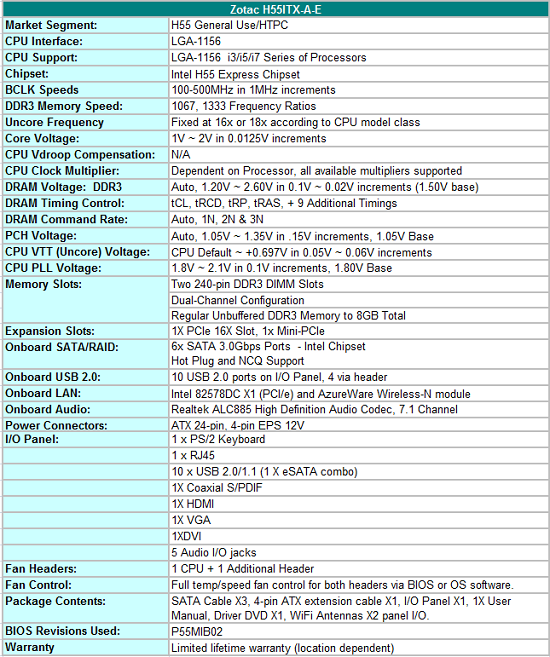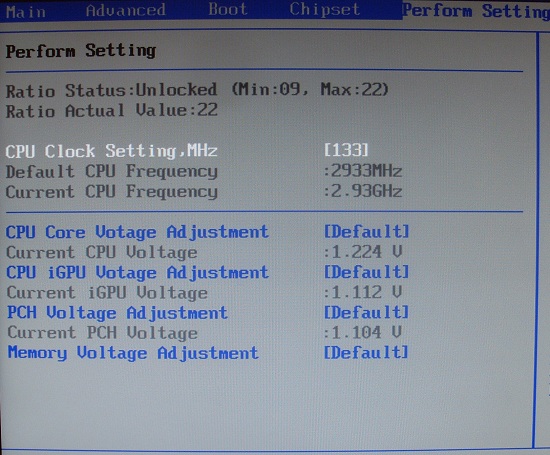Zotac H55-ITX Review - The World's First mini-ITX H55 Motherboard
by Joshua Youngberg on February 28, 2010 12:00 AM EST- Posted in
- Motherboards
Zotac’s H55-ITX WiFi can be purchased from a handful of retailers for around $140-$150.

The H55-ITX offers support for the entire line-up of socket 1156 processors. The board also comes packaged with a robust Realtek ALC888 audio codec which will be a boon to audio enthusiasts. Networking for the H55-ITX is handled by Intel’s 82578DC and an AzureWare 802.11n wireless card which is mounted in a mini-PCIe slot.
The board comes bundled with the following accessories:
- 3x SATA cables
- 1x 4-pin ATX extension
- 1x I/O panel
- 1x User Manual
- 1x Driver DVD
- 2x WiFi Antennae
- DVI to VGA Adapter
- Quick setup manual
BIOS
The H55-ITX’s BIOS is intuitive and easy to navigate in typical AMI fashion. A mild number of overclock settings are available as well as adjustment for an i3 processors GPU core voltage although the GPUs frequency cannot be modified. Furthermore, CPU VTT voltage can be monitored but not modified which is probably wise due to the already low maximum power delivery of the H55-ITX. Your typical array of general BIOS features such as power management and boot settings are listed as well.

The H55-ITXs BIOS can be updated in the Windows environment using a provided flashing utility. Personally we prefer DOS based flashing utilities due to the system stability provided outside the Windows environment.
















69 Comments
View All Comments
Duwelon - Sunday, February 28, 2010 - link
Wrong.GeorgeH - Sunday, February 28, 2010 - link
Actually, very not wrong.After a quick search, it looks like PCP&C 610W is only about 50% efficient at 30-40W (AC power) and about 70% at 70-60W.
This means the DC idle/load wattage numbers on the IGP are ~20W/50W. With a power supply rated at ~85% in that region, the measured power would be ~25W/60W, which is hugely different from the stated 35/76W - 30% "error" on the low end is pretty crappy.
michal1980 - Sunday, February 28, 2010 - link
really? tomshard was able to get idle power down to ~25wattshttp://www.tomshardware.com/reviews/25w-performanc...">http://www.tomshardware.com/reviews/25w-performanc...
now whos wrong?
have an address I have some crows pie to ship you.
mariush - Monday, March 1, 2010 - link
I'd rather use a bigger power supply (possible a Zen 400W passive one) and have the system use 40W instead of using that 220W power supply tom's hardware uses, with a 40 mm NOISY fan, just to get 22W.The difference in watts is so small my cell phone charger eats it when I leave it plugged in over night to charge my phone.
Duwelon - Sunday, February 28, 2010 - link
So efficiency does or doesn't matter with you? Reality shows efficiency is all that matters as long as you have a stable and fairly priced PSU...michal1980 - Sunday, February 28, 2010 - link
efficeny matters. But I doubt that a 610w power supply is very efficent @ 30watts.have you ever heard of the right tool for the job?
mindless1 - Sunday, February 28, 2010 - link
Have you ever heard of gathering more evidence before jumping to conclusions?The purpose is a relative, not necessarily absolute power measurement. Think about it, they are not trying to match every possible system configuration a user could have.
For that, a 610W PSU is fine.
Further, you don't factually know what the right tool for the job is because neither Tom's, nor most reviewers, test long term with minimally sized PSU (that tend to fail prematurely when ran at a higher % of total load rating).
The right tool for the job is not really the most efficient without considering anything else. Think about it, if you really cared about efficiency you would turn off the computer you are using instead to post on the internet!
michal1980 - Sunday, February 28, 2010 - link
what false conclusion? Did you even look at this review?except for the 860 cpu, @ load the system used less then 110watts of power. Using a PSU thats rated 6x that is a waste, on both ends, idle, and peak.
PSU's certified for 80+, have tragets at 20, 50, and 80% of loads. The efficency of most, if not all falls significantly below a 20% load.
a quailty 200W psu would be a much better fit for most systems builds then any 600w psu.
Duwelon - Sunday, February 28, 2010 - link
Have you ever heard of admitting your original statement was wrong to just move on? Thanks for admitting efficiency does matter after your first blunder and then acting like a turd to defend it. No doubt you can find a better PSU, but at least now we know you're smart enough to realize efficiency does matter and you don't think it's pulling 610watts out of the socket or something. Have a nice day.michal1980 - Sunday, February 28, 2010 - link
wrong about what?a 610 watt psu is overkill for a system running ~30-150w.
If you cannot understand that, you are too stupid to even continue this disscussion